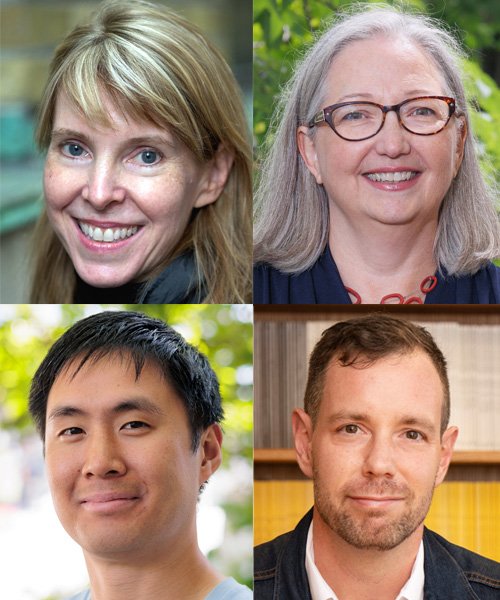How can we train the next generation to help build technologies that benefit society? As challenges such as AI safety, data privacy, bias, and misinformation become increasingly prevalent, it is vitally important for educators to provide students with the ability to incorporate ethical considerations into the design and deployment of technology.
The University of Toronto’s Embedded Ethics Education Initiative (E3I) aims to give students the knowledge, skills, and incentive to integrate ethical considerations into the design and deployment of technology. E3I is a teaching and learning venture that embeds paired ethics-technology education modules into undergraduate computer science courses. First piloted in 2020, the program has expanded to reach thousands of students and is being piloted in other STEM disciplines, including statistics, ecology and evolutionary biology, and geography.
Join E3I faculty leads Sheila McIlraith, Diane Horton, David Liu, and Steven Coyne on May 28, 2024, for “Building an Embedded Ethics Education Initiative,” an online video series exploring the creation and deployment of the University of Toronto Embedded Ethics Education Initiative. Whether you are a computer science or philosophy educator interested in piloting an embedded ethics education initiative at your university, a department chair or administrator looking for insights on building successful collaborations across disciplines, or simply interested in integrating ethics into STEM education, this series will provide an inspiring glimpse into logistics and teaching approaches that help to ensure advanced technologies benefit all of society.
The series comprises three contiguous sessions, each including a 20-30 minute presentation.
Sessions will guide participants through:
Session 1: An overview of E3I
[Download .pdf]Session 2: Lessons learned on teaching approaches, logistics, and strategies for growing a program
[Download .pdf]Session 3: How to craft successful ethics modules that pair with existing course content
[Download .pdf]
About the Embedded Ethics Education Initiative
A collaboration between the University of Toronto’s Department of Computer Science and Schwartz Reisman Institute for Technology and Society, in association with the Department of Philosophy, the University of Toronto Embedded Ethics Education Initiative (E3I) is an award-winning teaching and learning venture that embeds paired ethics-technology education modules into undergraduate computer science courses. Since its initial pilot in 2020, the initiative has grown to successfully engage thousands of students every year. E3I has been transformative for many students, with measured increases in their interest in ethics, their ethical sensitivity, and their ability to navigate ethical issues in the workplace. In recognition of the program’s impact, the project’s team leads Sheila McIlraith, Diane Horton, David Liu, and Steven Coyne received the prestigious 2024 Northrop Frye Award, an Award of Excellence from U of T’s Alumni Association.
Contact: embedded-ethics@cs.toronto.edu
About the speakers
Sheila McIlraith is a professor in the Department of Computer Science, University of Toronto, a Canada CIFAR AI Chair at the Vector Institute for Artificial Intelligence, and associate director and research lead at the Schwartz Reisman Institute for Technology and Society. McIlraith’s research is in the area of AI knowledge representation, automated reasoning, and machine learning. Her work focuses on AI sequential decision making broadly construed, through the lens of human-compatible AI, with more recent work focused on AI safety and alignment. McIlraith is a fellow of the ACM, a fellow of the Association for the Advancement of Artificial Intelligence (AAAI), and has received many awards for her research, a number of them with students.
Diane Horton is a professor, teaching stream in the Department of Computer Science at the University of Toronto and a faculty affiliate at the Schwartz Reisman Institute for Technology and Society. She is a passionate teacher who has made significant contributions to pedagogy, curriculum, and co-curricular activities. Her research is in computer science education. Horton’s work has been recognized by the University of Toronto’s highest honour for teaching, the President’s Teaching Award, and the Ontario Confederation of University Faculty Associations (OCUFA) Teaching Award, among others.
David Liu is an associate professor, teaching stream, and has taught in the Department of Computer Science, Faculty of Arts & Science (A&S), for the past nine years. He is the associate chair, undergraduate studies for the Department of Computer Science, and a faculty affiliate at the Schwartz Reisman Institute for Technology and Society. He has taught a broad range of computer science courses and topics, including introductory programming, data structures, systems and databases, and programming language theory. He has led or co-led multiple multidisciplinary collaborations to broaden computing education across A&S, including the creation of three interdisciplinary data science courses and a new Minor in Applied Data Science.
Steve Coyne is an assistant professor (CLTA) in the Departments of Philosophy and Computer Science. He holds a PhD in philosophy from the University of Toronto and a BSc in applied mathematics from the University of Calgary. Coyne is the main ethicist working for the Embedded Ethics Education Initiative (E3I). His recent research in political philosophy has been published in Philosophy and Public Affairs. He is also a faculty affiliate at the Schwartz Reisman Institute for Technology and Society.
About the Schwartz Reisman Institute
Located at the University of Toronto, the Schwartz Reisman Institute for Technology and Society (SRI) is a multidisciplinary research institute whose mission is to deepen knowledge of technologies, societies, and what it means to be human by integrating research across traditional boundaries and building human-centred solutions that make a difference. The integrative research we conduct rethinks technology’s role in society, the contemporary needs of human communities, and the systems that govern them. SRI is investigating how best to align technology with human values and deploy it accordingly. The solutions we build are actionable and practical, highlighting the potential of emerging technologies to serve the public good while protecting citizens and societies from their misuse. We want to make sure powerful technologies truly make the world a better place—for everyone.
Clockwise from top left: E3I team members Sheila McIlraith, Diane Horton, Steven Coyne, and David Liu.




